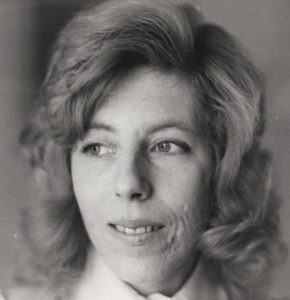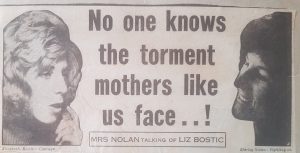“I want her to be remembered”
 It is hard to believe that today, 27th July, 40 years have passed since my mother Elisabeth Bostic died, age 33, from a tragic and accidental overdose. One of my main objectives for this website is to tell her story. She was not just a devoted mother, wife and daughter. She was a forceful campaigner and fundraiser who persuaded doctors to take risks they may never have done otherwise and enlisted the help and support of the press and public to save her son.
It is hard to believe that today, 27th July, 40 years have passed since my mother Elisabeth Bostic died, age 33, from a tragic and accidental overdose. One of my main objectives for this website is to tell her story. She was not just a devoted mother, wife and daughter. She was a forceful campaigner and fundraiser who persuaded doctors to take risks they may never have done otherwise and enlisted the help and support of the press and public to save her son.
Her campaigning led to the first ever register of volunteer bone marrow donors, which led to a donor being found for me, and the first ever bone marrow transplant from an unrelated donor. Shirley Nolan, another mother whose son, Anthony, would die without a transplant from an unrelated donor, rang my mother as soon as the news broke, and brought Anthony to London. That same panel of donors which had saved me became the enormous register of donors we know today as Anthony Nolan.
On this 40th anniversary I came across a newspaper interview with Shirley, given the week after my mother’s death, where she speaks of the courage and determination my mother inspired in her. It is a testament to the heroic, herculean strength that a mother will display in fighting for the lives of her children. Both their stories and the spirit of their endeavours live on in the charity and donor register that bears Anthony’s name.
Reading this article and remembering her legacy provides some solace for me today. I just haven’t the words to express how it was to lose her in this way, and at that time, or the effect this has had on me since. I am just so grateful that I did have her when I did and am able to connect with her through this story.
Original article is credited to Richard Shears in Adelaide and I think appeared in the Daily Mirror at the end of July 1978.

If any one person in the world understands the stresses that Elisabeth Bostic had to face before her tragic death it is Shirley Nolan.
Possibly even more than members of Mrs Bostic‘s immediate family, Mrs Nolan can comprehend the full depth of all the sorrows and tiredness that led to that last confused action of accidentally swallowing an overdose of drugs.
Because Mrs Nolan is a woman who was gone through the same experiences: the joy of giving birth to a son, swiftly followed by the heartache of being told that he was certain to die. And because she too had the willpower to fight on against immense odds, in the hope that her child’s life can be saved.
Mrs Bostic died in hospital on Thursday after being unconscious for two weeks. Her son Simon, the world’s first bone marrow transplant patient, had been taken ill with pneumonia and, said her husband, she was ‘so upset that she made a terrible mistake’.
Through their shared problems the two women met and became close, although they lived on opposite side of the world.
“In the battle to keep my own little boy alive Liz was my greatest ally” said Mrs Nolan at her home in Adelaide yesterday.
“I had wanted to end it all in the early days and it was Liz who kept me going.
“The last time I saw her, the very last word she said to me was ‘I don’t know how you keep going but don’t stop’.
“And now she’s dead. Why is life so cruel?”
Mrs Nolan, at 34 the same age as Mrs Bostic, spoke to me bravely about the sadness that surrounded her own life and that of Mrs Bostic, whose son had an operation in 1973 because a suitable donor was found.
GLIMMER OF HOPE
For Mrs Nolan the search for a donor for her seven-year-old Anthony goes on.
“I have lived through seven years of absolute hell,” she said. “Liz lost one little boy with the same problem, but when Simon had his operation she told me that the worst of her troubles were over.
“I cried for two hours when I heard she had died. And then I telephoned some close friends of hers in England to ask what had happened.
“I can still hardly believe that she has gone because I strongly believe that it is through her encouragement that I am here today.”
“Yes I’ve wanted to give up. I don’t expect anyone to fully comprehend the mental torment of having to care for a little boy who could just fade away at any moment. Even when I was having that traumatic telephone call to England to talk about Liz, Anthony started haemorrhaging, bleeding from the nose. At this very moment he’s alright. Internal bleeding could start again at any second.”
The two mothers first spoke after Mrs Nolan read about Simon Bostic‘s operation in 1973. The news gave her a glimmer of hope for Anthony who, in 1971, doctors had said was incurable.
“There is no point in keeping him alive,” Mrs Nolan remembers the doctors telling her and that night she and her husband drank a bottle of brandy between them and wept buckets.
When she heard of Simon‘s operation she telephoned Mrs Bostic. “She told me that she had watched one little boy, Andrew, die from the disease but she was confident that Simon was going to be alright.
“Her words were enough to take me to London where we met and began what was and still is a long hard struggle to find donors for helpless children like Anthony
“We fought hard together to raise funds for research and we spent many hours talking on the telephone when I was living with Anthony in the cottage in Kent. Last time we met was at the Mansion House where tributes were paid to Mrs Bostic and myself.
WILL TO LIVE
“On the way back to Charing Cross station where I was catching the train to Kent I clearly remember Liz chatting to me and saying:
‘Shirley it never ends, does it? Even though Simon had a successful operation I still wonder sometimes whether he will always be alright.’
“I knew that deep within our hearts we each felt strong sympathy for the other. At that very moment in the car as she spoke those words on the way to the station I realised that in spite of my worries, I wasn’t really alone.”
“And now that Liz is dead I am all alone again with my sick little boy and a hard fight ahead.”
“People will wonder whether I can go on like this not knowing where the future lies. Will it be a feature of happiness or grief?”
“Liz’s death has struck me badly but I must always be aware that my giving up is going to do nothing for Anthony. I started a fight for him and I must finish it.”
“Last December the doctors told me he had a week to live. It brought me down to a low ebb but I was determined not to give up, and then he had a miraculous recovery. He is living now on antibiotics and psychologically he is much better. At one stage he had given up the will to live, but he now goes across to the local primary school to play for half an hour with the children every day.”
Mrs Nolan will be flying to London in September for the official opening of the Anthony Nolan Laboratories in Westminster Hospital where the first national tissue register in the world has been set up. It was thanks mainly to Mrs Nolan that the £1,200 for the equipment was raised. She is working on the final stages of a book about life with Anthony entitled “A Kiss Through Glass”, and which she says will now have an additional section devoted to the life and death of Liz Bostic.
“I want her to be remembered” said Mrs Nolan “Someone who gave me the courage to fight on deserves a lasting memory.”
130 Replies to ““I want her to be remembered””
❤️
Thank you Liz and Shirley 💖